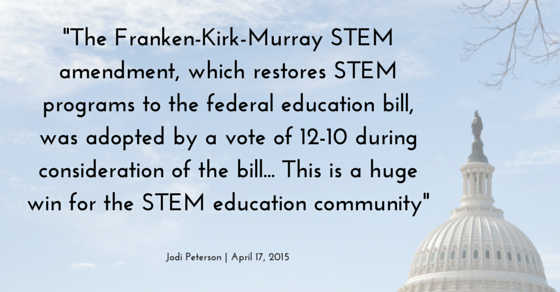Senate Education Committee Passes ESEA Reauthorization Bill
By Jodi Peterson
Posted on 2015-04-17
 On Thursday April 16, 2015, on a unanimous vote of 22-0, the Senate HELP Committee approved a bipartisan bill that rewrites the Elementary and Secondary Education Act (No Child Left Behind). This means the bill will go to the Senate floor for final consideration, although floor time has not yet been scheduled.
On Thursday April 16, 2015, on a unanimous vote of 22-0, the Senate HELP Committee approved a bipartisan bill that rewrites the Elementary and Secondary Education Act (No Child Left Behind). This means the bill will go to the Senate floor for final consideration, although floor time has not yet been scheduled.
During Senate markup of the bill, known as the Every Child Achieves Act, 60 amendments were debated, 21 amendments offered and withdrawn, 29 amendments were passed, and 8 amendments failed. See the list of amendments here. Most of the amendments were adopted via voice vote with little controversy or withdrawn out of respect for maintaining the bipartisan nature of the legislation.
I’m pleased to note that the Franken-Kirk-Murray STEM amendment, which restores STEM programs to the federal education bill, was adopted by a vote of 12-10 during consideration of the bill. The amendment language stipulates that each state receive formula-based funding to support partnerships between local schools, businesses, universities, and non-profit organizations to improve student learning in the critical STEM subjects. Each state would choose how to spend and prioritize these funds, which can support a wide range of STEM activities from in-depth teacher training, to engineering design competitions, to improving the diversity of the STEM workforce. This is a huge win for the STEM education community. See More Details on Franken-Kirk-Murray STEM Funding Amendment.
NSTA was very active in advocating for this amendment. We also spearheaded a letter with the STEM Coalition to Senate HELP Committee leaders urging support for STEM education as an ESEA priority. The letter was signed by a diverse array of more than 90 local, state, and national organizations that includes teacher and education groups, and professional and civic societies, and major corporations. Read the letter here.
Three amendments also to note, now part of the bill: An amendment from Sen. Richard Burr, R-N.C. would alter the Title II funding formula so that it’s based 80 percent on poverty and 20 percent on population.
An amendment by Sen. Tammy Baldwin, D-Wis., would allow states to use federal funds to audit the number and quality of tests and eliminate any they deem ineffective or of low-quality. The same provision was adopted in the House ESEA bill.
There were also a number of amendments relating to Title I portability introduced then withdrawn, that would allow funding for low-income students to follow those students to the public or private school of their choice. It is expected that these amendments, and amendments to strengthen the accountability system, will be offered during floor debate in the Senate.
My April 10 blog post outlines most of what is in the Every Child Achieves Act and you can read more about the mark up in this Education Week blog. Hill staffers are now incorporating amendment language into the bill, and we will bring you the final product when it is released and news on when/if this bill will reach the Senate floor.
Stay tuned and look for upcoming issues of NSTA Express for the latest information on developments in Washington, DC.
Jodi Peterson is Assistant Executive Director of Legislative Affairs for the National Science Teachers Association (NSTA) and Chair of the STEM Education Coalition. e-mail Jodi at jpeterson@nsta.org; follow her on Twitter at @stemedadvocate.
The mission of NSTA is to promote excellence and innovation in science teaching and learning for all.
Follow NSTA
Disclaimer: The views expressed in this blog post are those of the author(s) and do not necessarily reflect the official position of the National Science Teaching Association (NSTA).


